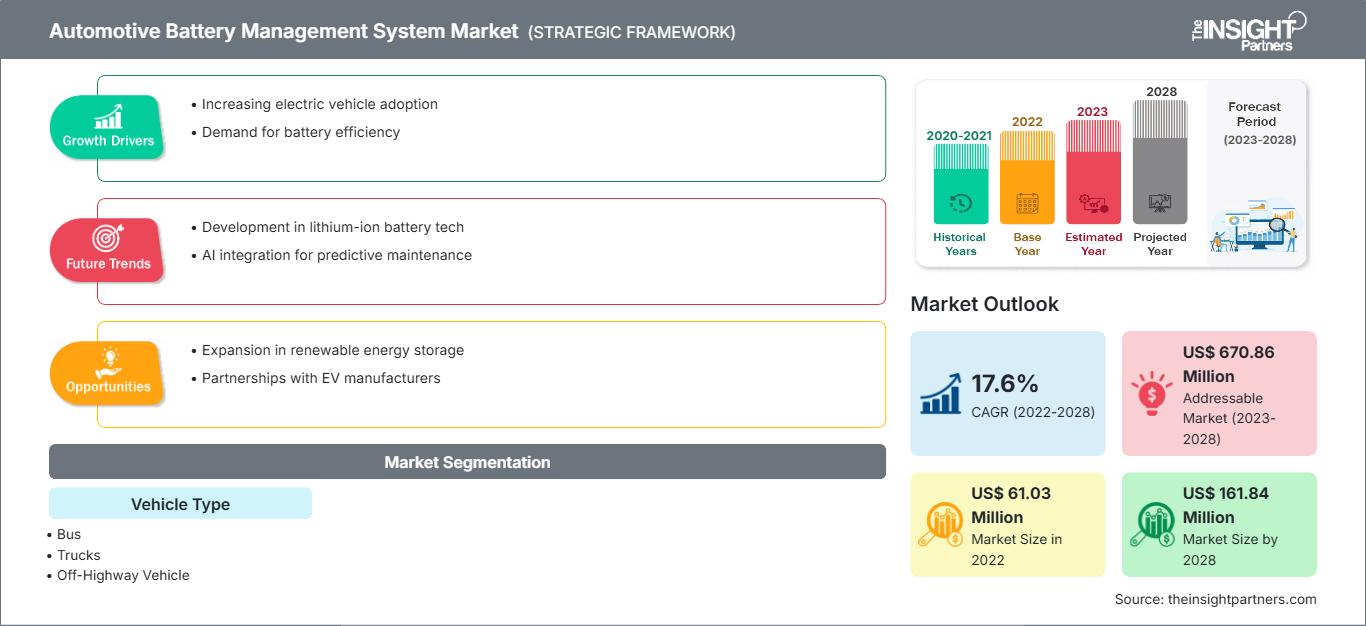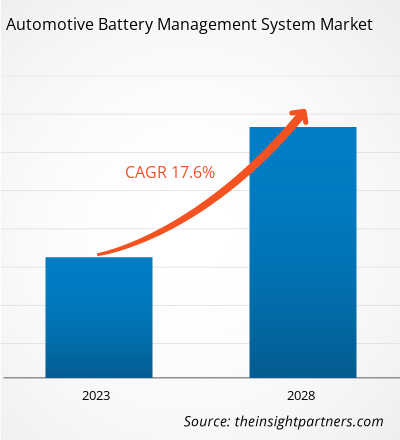자동차 배터리 관리 시스템 시장은 2022년 6,103만 달러에서 2028년까지 연평균 17.6% 성장할 것으로 예상됩니다.
배터리 관리 시스템은 고전압 하이브리드 및 전기 자동차에 사용되는 배터리를 관리합니다. 전기 자동차 제조업체와 배터리 팩 제조업체는 배터리 팩을 보호하기 위해 배터리 관리 시스템을 리튬 이온 배터리에 통합합니다. 전기 자동차의 전체 배터리 시스템은 배터리 모듈, 센서, 컨트롤러, 열 관리 시스템, 배터리 관리 시스템 등 여러 구성 요소의 조합으로 구성됩니다. 환경 보호에 대한 우려가 커지고 각국 정부의 배출 감축 노력에 힘입어 2022년부터 2028년까지 전기 및 하이브리드 자동차 수요가 놀라운 속도로 증가할 것으로 예상됩니다. 이는 자동차 배터리 관리 시스템(BMS) 시장 성장을 촉진할 것입니다.
글로벌 전기 자동차 및 배터리 팩 산업은 미쓰비시, 닛산, 테슬라와 같이 매우 유명하고 재정적으로 탄탄한 몇몇 기업들이 존재하는 것이 특징입니다. 이로 인해 자동차 배터리 관리 시스템 시장에서 구매자의 협상력이 상당히 높습니다. 전기 자동차에 대한 지속적인 연구 개발과 빠른 자동차 배터리 관리 시스템 시장 성장이 맞물려 2019년부터 2027년까지 구매자의 협상력은 높은 수준을 유지할 것으로 예상됩니다. 자동차 배터리 관리 시스템 시장의 주요 기업들은 자사 차량용 배터리 시스템을 계획할 때 다양한 전략을 사용합니다. 기술 분야의 지속적인 발전은 배터리 관리 시스템 공급업체들이 시장 지위를 유지하기 위해 변화에 적응해야 한다는 압력을 가할 것으로 예상됩니다. 이러한 사실로 인해 구매자는 특정 요구 사항과 BMS 공급업체의 기술 포트폴리오에 따라 시간이 지남에 따라 BMS 공급업체를 전환하는 경향이 높습니다.
요구 사항에 맞게 이 보고서를 사용자 정의하십시오.
이 보고서의 일부, 국가 수준 분석, Excel 데이터 팩을 포함하여 모든 보고서에 대한 사용자 정의를 무료로 받을 수 있을 뿐만 아니라 스타트업 및 대학을 위한 훌륭한 제안 및 할인을 이용할 수 있습니다
자동차 배터리 관리 시스템 시장: 전략적 통찰력

-
이 보고서의 주요 주요 시장 동향을 확인하세요.이 무료 샘플에는 시장 동향부터 추정 및 예측에 이르기까지 데이터 분석이 포함됩니다.
COVID-19 팬데믹이 자동차 배터리 관리 시스템 시장 점유율에 미치는 영향
COVID-19 발생은 2020년 정점에 달했을 때 세계 경제에 큰 영향을 미쳐 제조업계의 사업 활동을 방해했습니다. 발생 전에는 전기 자동차 판매 증가, 가처분 소득 급증, 신용 및 자금 조달의 용이성으로 인해 자동차 배터리 관리 시스템 시장 점유율이 상당한 성장을 경험하고 있었습니다. 또한, 전기 자동차 개발에 대한 상당한 투자 계획으로 자동차 배터리 관리 시스템 수요가 촉진되고 있습니다. 국제 청정 교통 위원회(ICCTC)에 따르면, 2021년 전 세계 EV 판매량은 690만 대로 사상 최고치를 기록했으며, 이는 2020년 대비 107% 증가한 수치입니다. 그러나 COVID-19 팬데믹의 시작으로 EV에 대한 투자 및 생산이 둔화되었습니다. 팬데믹 초기에는 위기로 인해 자동차 배터리 관리 시스템 시장을 교란시킨 모든 사업 거래, 협업 및 파트너십이 크게 제한되었습니다. 팬데믹의 출현으로 2020년 2월 자동차 판매가 차질을 빚었습니다. 더욱이 4월까지 미국에서의 판매량은 47%, 유럽에서는 80% 감소했습니다. Statista 보고서에 따르면, 2020년 전 세계 자동차 판매량은 6,380만 대로 감소했으며, 2021년에는 6,600만 대로 완만한 회복세를 보였습니다.
시장 분석 - 자동차 배터리 관리 시스템 시장
전기차 판매 증가 및 전기자동차 인프라 확장
환경 보호에 대한 우려 증가와 저배출 및 무배출 차량 도입을 장려하는 정부 정책으로 인해 전기자동차(EV) 판매가 빠르게 증가하고 있습니다. 정부의 보조금 및 세금 환급은 제조업체의 공정 확장을 촉진합니다. 글로벌 전기자동차 전망에 따르면, 완전 전기차 및 플러그인 하이브리드 차량을 포함한 전기자동차 판매량은 2021년에 660만 대에 달했습니다. 같은 해 중국의 판매량은 급증하여 330만 대에 달했으며, 이는 전 세계 판매량의 약 절반을 차지했습니다. 또한, 2021년 유럽에서는 전기차 판매량이 65% 증가하여 230만 대에 달했고, 미국에서는 판매량이 두 배 증가하여 63만 대에 달했습니다. 충전 인프라 투자 증가와 정부 지원 정책 확대로 배터리 생산 규모가 확대되면서 자동차 배터리 관리 시스템(BMS) 시장 수요가 증가하고 있습니다.
차량 유형 기반 분석
자동차 배터리 관리 시스템(BMS) 시장은 차량 유형에 따라 버스, 트럭, 비도로 차량으로 구분됩니다. 2022년에는 탄소 배출 감축을 위한 버스 배터리 도입 증가로 버스 부문이 자동차 배터리 관리 시스템 시장에서 가장 큰 점유율을 차지했습니다. 또한, 트럭 부문은 예측 기간 동안 가장 높은 연평균 성장률(CAGR)을 기록할 것으로 예상됩니다. 최적의 배터리 성능 및 배터리 팩 온도 모니터링을 위한 이니셔티브가 증가함에 따라 전기 버스 제조업체의 배터리 관리 시스템 수요가 크게 증가하고 있습니다. 또한, 탄소 배출 감소를 위해 여러 국가에서 전기 스쿨버스에 대한 수요가 증가하고 있으며, 이는 전기 스쿨버스 제조업체의 생산 라인 확장을 가능하게 합니다. 여러 국가의 여러 정부가 친환경 기술 버스를 도입하고 있으며, 이는 전기 버스 수요를 촉진하여 자동차 배터리 관리 시스템(BMS) 시장의 성장을 촉진하고 있습니다.
자동차 배터리 관리 시스템 시장 지역별 통찰력
The Insight Partners의 분석가들은 예측 기간 동안 자동차 배터리 관리 시스템 시장에 영향을 미치는 지역별 동향과 요인들을 면밀히 분석했습니다. 이 섹션에서는 북미, 유럽, 아시아 태평양, 중동 및 아프리카, 그리고 중남미 지역의 자동차 배터리 관리 시스템 시장 부문 및 지역별 현황도 살펴봅니다.
자동차 배터리 관리 시스템 시장 보고서 범위
| 보고서 속성 | 세부 |
|---|---|
| 시장 규모 2022 | US$ 61.03 Million |
| 시장규모별 2028 | US$ 161.84 Million |
| 글로벌 CAGR (2022 - 2028) | 17.6% |
| 이전 데이터 | 2020-2021 |
| 예측 기간 | 2023-2028 |
| 다루는 세그먼트 |
By 차량 유형
|
| 포함된 지역 및 국가 |
북미
|
| 시장 선도 기업 및 주요 회사 프로필 |
|
자동차 배터리 관리 시스템 시장 참여자 밀도: 비즈니스 역학에 미치는 영향 이해
자동차 배터리 관리 시스템(BMS) 시장은 소비자 선호도 변화, 기술 발전, 그리고 제품 이점에 대한 인식 제고 등의 요인으로 인한 최종 사용자 수요 증가에 힘입어 빠르게 성장하고 있습니다. 수요가 증가함에 따라 기업들은 제품 라인업을 확장하고, 소비자 니즈를 충족하기 위한 혁신을 추진하며, 새로운 트렌드를 적극 활용하고 있으며, 이는 시장 성장을 더욱 가속화하고 있습니다.

- 을 얻으세요 자동차 배터리 관리 시스템 시장 주요 주요 플레이어 개요
자동차 배터리 관리 시스템(BMS) 시장에서 활동하는 업체들은 주로 첨단 고효율 제품 개발에 집중하고 있습니다.
- 2021년 8월, 배터리 전문 기업인 Varta와 개발 및 생산 서비스 제공업체인 Continental Engineering Services(CES)는 협력을 발표했습니다. 두 파트너는 첫 번째 시범 프로젝트의 일환으로 10kW 이상의 전기 구동 이륜차용 교체형 48V 배터리 팩을 공동 개발했습니다.
- 2021년 6월, 전기 모빌리티 분야를 위한 우수한 열 관리 시스템을 개발하는 이스라엘 기업 Carrar는 최첨단 열 관리 솔루션 분야의 선두 기업이자 시장 선도 기업인 Gentherm이 시드 투자 라운드의 주요 투자자가 되었다고 발표했습니다.
자동차 배터리 관리 시스템 시장은 북미, 유럽, 아시아 태평양(APAC), 기타 지역 등 5개 주요 지역으로 구분됩니다. 2022년에는 아시아 태평양 지역이 상당한 매출 점유율로 시장을 주도했으며, 유럽이 그 뒤를 이었습니다. 또한 아시아 태평양 지역은 2022년부터 2028년까지 시장에서 가장 높은 연평균 성장률(CAGR)을 기록할 것으로 예상됩니다.
Continental AG, Dana Limited, GENTHERM, Hanon Systems, Mahle GmbH, NXP Semiconductors, Renesas Electronics Corporation, Robert Bosch GmbH, Valeo, Marelli Holdings Co., Ltd.는 자동차 배터리 관리 시스템 시장의 주요 기업입니다. 본 시장 보고서는 주요 기업들이 향후 성장 전략을 수립하는 데 도움이 되는 상세한 시장 통찰력을 제공합니다.
- 과거 분석(2년), 기준 연도, CAGR을 포함한 예측(7년)
- PEST 및 SWOT 분석
- 시장 규모 가치/거래량 - 글로벌, 지역, 국가
- 산업 및 경쟁 환경
- Excel 데이터세트
최근 보고서
관련 보고서
사용 후기
구매 이유
- 정보에 기반한 의사 결정
- 시장 역학 이해
- 경쟁 분석
- 고객 인사이트
- 시장 예측
- 위험 완화
- 전략 기획
- 투자 타당성 분석
- 신흥 시장 파악
- 마케팅 전략 강화
- 운영 효율성 향상
- 규제 동향에 발맞춰 대응






















 무료 샘플 받기 - 자동차 배터리 관리 시스템 시장
무료 샘플 받기 - 자동차 배터리 관리 시스템 시장